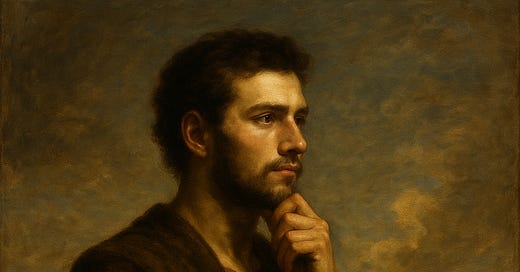Prime Principles: Pirke Abot 4:1 (Part II): "Who is Strong?"
The source of strength is the mastery of our drives.
Ben Zoma’s framework for understanding greatness in human beings runs deep. In his teaching in the first Mishnah of the fourth chapter of Pirkei Avot, he presents four central pillars of life—wisdom, strength, wealth, and honor. Each is redefined, not by external benchmarks, but by inner mastery. Having looked at his view on wisdom, we now turn to his definition of strength:
Ezehu gibor? Hakovesh et yitsro. Who is strong? One who conquers one’s drives.
We begin, as we must, with the recognition that the human being is built on drives—thousands of years of biological programming aimed at survival and reproduction. These forces are not incidental; they define the organism. They animate our instincts, shape our fears, and fuel our competitiveness. Whether we like it or not, the ancient wiring in our brains continues to run much of the show.
This isn’t conjecture. Our behaviors mirror it. The polar bear stalks prey over sheets of ice with near miraculous precision because it has adapted over millennia to do so. We, too, have been shaped by an unforgiving developmental history, tailored by nature to best secure the future of our genes.
But the human story shifted course. Somewhere along the way, a new capacity emerged—consciousness. The ability to think about thinking. The ability to choose. We began to be able to imagine, reflect, and consider. That changed everything.
Suddenly, we could imagine a world that doesn’t yet exist and make it real. We could create symphonies, build cities, establish laws, and form relationships that are more than just transactional. But this emergence did not replace the drives. It layered over them.
We now live with two competing engines. One is primitive, ancient, and survival-based. The other is reflective, aspirational, and self-aware. They often do not agree. To master one's life is to manage this tension. It is to recognize the drives, to honor their evolutionary role, but to rule over them as a sovereign, not as a servant.
Our society celebrates external strength that secures domination and conquest of all types. These are drive-based expressions. They may win wars and capture attention, but they do not signify mastery. Ben Zoma presents another type entirely: the inner strength to restrain, to hold, to resist. This is the strength of a being who is free.
This tension plays out in everything we do. In business, for example, the instinct may be to dominate the competition—to win and to acquire. It may look sophisticated, but it's the buffalo hunt dressed in a suit. That moment when a colleague is undercut or trust is breached for the sake of a gain—that is not mastery. It is merely the same drive sublimated to a more socially accepted level.
Ben Zoma demands something more refined: dominion over the self. He charges us to drive our own lives rather than be driven. This strength is rare. It requires judgment, stamina, and an unwavering commitment to building an identity of integrity. It requires the ability to discern what is truly mine—what I desire as a conscious being—and what is a whisper from ancient survival software.
This kind of strength cannot emerge without self-value. To conquer one's drives, one must believe one is worth protecting. Every time we give in to a drive that undermines who we know ourselves to be or who we can be, we sell ourselves short. We betray the aim of living a principled life.
And so, Ben Zoma reframes strength. The gibor - strong person is not the warrior on the field but the sovereign of the inner world. It is the one who can say no to temptation, not from fear or repression, but from clarity and commitment.
Our capacities are immense. The same creativity that allows us to manipulate, seduce, or dominate, can also be used to build, uplift, and illuminate. The drive to create is neutral. The question is: for what purpose is it harnessed?
This is why the Mishna doesn’t say "who avoids desire" but "who conquers it." The creative impulse is not inherently evil. It is our greatest asset. But it must be guided. The same engine that propels the predator can be used to compose music, raise children, or build a community. Mastery over that engine—that is true strength.
Ben Zoma’s teaching is deeply personal. In every moment of life, we are either driving or being driven. We know the difference. We feel it. And every time we stand up to a drive—with integrity, with mindfulness—we grow stronger. And if we can’t muster the strength to stand up to it, we must discover the tactics necessary to gain control over it. The study of these tactics, be it in the nature of habits and how they form, personal biases and influences, or simply the company we keep, Ben Zoma teaches us that these things are imperatives and require training.
The strength that we call gevura in Hebrew is specifically the strength of restraint. It is the strength that comes from knowing who I am and insisting on living by it. It is the refusal to be a tool of my drives. It is the commitment to becoming the self I was created to be.
That is true strength. And it is the formidable foundation upon which everything else in life must stand.




